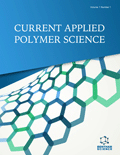To find the most relevant journal, please insert appropriate keyword to facilitate search.
Search Results: CAPS
Current Applied Polymer Science
ISSN: 2452-2716 (Print)
eISSN: 2452-2724 (Online)
Current Applied Polymer Science is not limited to a specific aspect of the field but is instead devoted to a wide range of sub-fields. Articles of an interdisciplinary nature are particularly welcome. Submissions in the following areas are of special interest to the readers of this journal:
- Artificial Intelligence in Polymers
- Biopolymers and Sustainable Polymers
- Data Mining Techniques
- Industrial Applications of Polymers
- Machine Learning Applications
- Modeling and Simulation
- Polymer Blends and Alloys
- Polymer Coatings and Adhesives
- Polymer Composites and Nanocomposites
- Polymer Degradation and Stability
- Polymer Electronics and Photonics
- Polymer Processing and Engineering
- Polymer Rheology and Mechanics
- Polymer Surfaces and Interfaces
- Polymer Synthesis and Characterization
- Polymers for Energy Storage and Conversion
- Polymers in Medicine and Biotechnology
- Recycling and Environmental Impact of Polymers
- Smart Polymers and Responsive Materials
Editor-in-Chief:
Federal University of Rio de Janeiro
Rio de Janeiro
Brazil
Indexed in:
Portico, OpenAire, Ulrich's Periodicals Directory, Scilit, QOAM, JournalTOCs, J-Gate, Google Scholar, Dimensions, CNKI Scholar, Cabell's Directory/Journalytics, British Library... View all
Special Issues With Active Call for Papers
Functional Conjugated Polymers and Sensor Applications
The term "conjugated polymers" refers to a sub-branch of polymer science. Conjugated polymers are polymers formed by adding various functional groups (usually organic compounds) to one end of a polymer chain. These functional groups can change the properties of the polymer or cause certain changes in the polymer. Conjugated polymers are an interesting class of materials widely used in the design of flexible electronic devices. One motivation is the idea that their polymeric nature inherently... see more
Revolutionizing Natural Polysaccharides with State-of-the-Art Grafting Techniques
The proposed thematic issue, "Revolutionizing Natural Polysaccharides with State-of-the-Art Grating Techniques", aims to explore the transformative potential of advanced grating methods in the study and application of natural polysaccharides. Polysaccharides, with their diverse structures and functions, are essential biomolecules in numerous fields, including pharmaceuticals, food science, and materials engineering. However, unlocking their full potential requires innovative techniques to manipulate and analyze their complex structures effectively. This issue will gather cutting-edge research and reviews that delve... see more
New Advances in Chemoenzymatic Processes
Chemical transformations that take advantage of the biocatalysis process are of great interest to chemists. The specific activity and selectivity of the enzymes allow them to perform different chemical reactions with high regio- and stereoselectivity, in addition, they reduce reliance on harsh chemical reagents and promote greener, more sustainable processes. The development of biocatalytic processes was able to establish many industrial processes and chemosynthetic routes. Therefore, the section aims to increase our knowledge of enzymatic... see more
Advancements in Polymer Nanocomposites for Sustainable and High-Performance Applications
Polymer nanocomposites represent a significant breakthrough in materials science, offering enhanced properties and new functionalities for a wide range of applications. This thematic issue will explore the latest advancements in the field, focusing on sustainable development and high-performance applications. Topics will include novel synthesis methods, innovative nanomaterials, and their integration into polymers to create materials with superior mechanical, thermal, and electrical properties. Additionally, the issue will address the environmental impact and recyclability of polymer nanocomposites,... see more
Application of 3D Printed Polymer and its Composites
This special issue focuses on the extensive applications of 3D printed polymers and composites in engineering, exploring how they are driving innovation in design and manufacturing. By analyzing the selection of polymer materials, optimizing printing processes, designing novel structures, and examining specific case studies in various engineering applications, this special issue aims to comprehensively reveal the potential of 3D-printed polymers and composites. In terms of materials, it includes in-depth research into the mechanical performance of... see more
